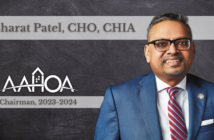Lifetime AAHOA member Dr. Kiran Patel, a philanthropist and hotelier, opens up about his philosophy, perseverance, giving back and looking ahead.
by SUSANNA DANIEL
Three topics keep coming up during a conversation with Dr. Kiran Patel, a cardiologist-entrepreneur-philanthropist who’s dipped heavily into luxury hotels in recent years: his culture, his family and his confidence.
“In my culture, the Indian culture, it is said that you ought to treat your guests with as much respect and love as you give to God,” he said in an interview. “It’s ingrained that we must take care of people.”
Which might be part of why, back in 1976, only five years into his practice as a cardiologist, Patel found himself scrubbing bathrooms and changing sheets in a 23-room motel owned by his youngest brother. Patel and his wife, Dr. Pallavi Patel, had flown in to give his brother his first day off in more than a year.
But the morning after they arrived, with guests booked into every room, not one housekeeper showed up to work.
“It was boots on the ground from the beginning,” said Patel, who didn’t return to hospitality until after he’d made a name in healthcare, and who today owns more than $500 million of hotels in Colorado, Wyoming, Arizona, and Oregon, including the brand-new 450-room Wyndham Beach Resort in Clearwater Beach, Florida.
The Patels, or Dr. K and Dr. P, as they’re known to friends, earned their advanced specializations in New York before moving to Florida in 1982 to set up their practices and be near family, and to trade snowstorms for sunshine. They’ve lived in Florida since.
“The weather was a no brainer,” said Patel.
In the 1990s, when he noticed the growing trend toward HMO-managed care, Patel sought to make the system work for doctors by buying a struggling Medicaid provider named WellCare, which he turned around and sold in 2002 for $200 million.
Since, he’s continued to acquire companies that are in debt and negotiate down their liabilities, then cut costs and improve service. This is how, during the real estate crisis of 2008-2011, he acquired his first hotel.
Given his humble start in life – he was born in Zambia to Indian parents – luxury hotels might seem at first glance like a surprising choice for Patel.
“When I was young, staying at hotel was virtually impossible financially and socially. If I had relatives in a given place and I went to a hotel instead of staying with them, it would have been an insult, no matter the size of their home. That’s the culture.”
Home size has become something of a hot topic for the Patels. They’re in the process of building a pink-hued, Taj-Mahal-style, 32,000-square-foot family palace on 17 acres in Tampa. When it’s finished, the Patels and their children and grandchildren will live on the property together.
Theirs will be the largest residential property in the county; you can see the glass dome of the central hall from the highway.
Thinking big hasn’t ever been a problem for Patel, who makes no bones about his own rainmaking abilities.
“My biggest strength and my biggest weakness is that I believe I’m the smartest guy on the planet,” said Patel, chuckling. “When I believe in something it’s difficult to dissuade me; you’d have to provide overwhelming evidence to prove me wrong. When I want something, I go after it, and it’s only a question of time before I will succeed.”
The family estate will be grand, but it won’t nearly contain the Patels’ wealth. Among their extensive philanthropic endeavors, they’ve built hospitals in Zambia and India, and have donated generously to the University of South Florida, among other organizations.
“I’ve been fortunate enough to be able to create my own worlds in every capacity, in business and in medicine,” he said. “My own empires or kingdoms, depending on your perspective.”
It’s not in Patel’s nature to shirk credit for his own substantial success, but his culture, his father and his wife do get a few nods of appreciation.
“Being an Indian means that business is in my blood,” he said.
And as for his father, Patel recalls that in his childhood home, the focus was always on education. About schoolwork, his father would tell him, “If you’re second, don’t even bother coming home.” It’s a lesson he took to heart.
Patel’s wife of 40-plus years consistently provides checks and balances when his ambition level skyrockets.
“I listen to her, of course, but she is often 180 degrees from me. Her job is to tell me where the landmines are and why I won’t succeed, and my job is to make sure that I dodge those landmines so that I do succeed.”
The industry has changed since Patel edged in vicariously by using his natural business savvy to help friends and family renegotiate debts. Today, it’s the franchises, not the banks, where Patel sees the most potential for negotiation, though those waters haven’t yet been tested, at least not by him.
“Negotiating with the franchises is difficult, and that’s a problem. Some of their policies aren’t in line with my thinking, but they apply one rule to everyone.”
One of his franchises rolls out new hardware and software every few years, for example, but the price is, in Patel’s view, way over market. “If I could use my own vendors, I could do it at a fraction of the cost,” he said. “These are the kinds of things I’m just starting to learn.”
He’s also learning how to balance new and better technologies with age-old personal attention, a balance that he thinks will be key for the industry in coming years. He cites hotels near medical offices and airports as places where efficiency and convenience are replacing human customer service.
“It’s a question of volume, and the trend is coming to hospitality,” he said. “Now, at peak times, customers can check in and get straight to their rooms without waiting, which is a good thing, unless it comes at the cost of that experience of being treated royally when you move into a four- or five-star hotel, where you feel something special.”
The key, he believes, is balance. “Maybe we compromise on things like check in and check out, because those conveniences are good tradeoffs,” he said. “But the core business is called hospitality, and we can’t forget that part.”
Patel’s career in hospitality started with family, and though he shows no signs of slowing down, he plans eventually to pass the torch to the next generation. His daughter, who is also a physician and has an MBA, has been getting more engaged in the industry in recent years.
“My role now is to help the second generation by providing the resources for them to build their portfolios,” he said.
Resources, yes, but also roots. With the onslaught of convenience amenities and the rising costs of labor, he worries that the next generation of hospitality pioneers will lose sight of the top priority: the guest.
“Focus on the guest, and everything else will fall into place. A focus first on the bottom line will point you toward failure,” he said.




